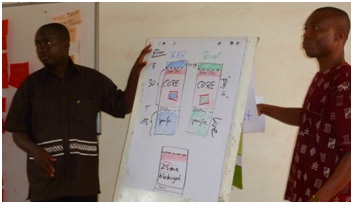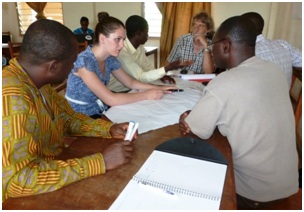- English
- Français
- Português
Update from ACi: ACi Holds Workshop to Design Radio Campaign
During a three day workshop in early May organized by the African Cashew Initiative (ACi), participants explored the strength of rural radio programs and their ability to function as an extension tool to support farmer training. Since radio presents the main and sometimes only source of information for rural communities, it can provide cashew farmers with valuable information on cashew production and marketing. An activity-based radio program following the “cashew calendar” covers training modules such as: the installation of new plantations, management practices for cashew p Presentation by Farm Radio International on the possible format for a cashew radio program.
Presentation by Farm Radio International on the possible format for a cashew radio program.
lantations including “good agricultural practices”, harvest and post-harvest methods as well as maintenance of the cashew farm.
So far, ACi has provided interactive training sessions for more than 20,000 cashew farmers in Ghana. As farmer income depends on the quality of the cashew kernels, ACi aims at increasing the outreach to farmers, encouraging them to adopt recommended practices and techniques to increase the quality of their produce. Training sessions make use of picture material accompanied by questions and answers and practical demonstrations in the field through extension agents, as well as ICT applications via text messages and a few radio programs
 Group discussions on the design of a participatory radio program with representatives from MOFA, Farm Radio International, Cashew Cooperatives, ACi, Grameen Foundation and Royals FM Radio Station.
Group discussions on the design of a participatory radio program with representatives from MOFA, Farm Radio International, Cashew Cooperatives, ACi, Grameen Foundation and Royals FM Radio Station.
During the workshop, representatives from the Market-Oriented Agricultural Program (MOAP), the regional directorate of the Ministry of Food and Agriculture (MOFA), and the Grameen Foundation as well as two local radio stations (BAR Radio Sunyani and Wenchi Royals FM) recognized several radio formats for transferring the various training modules into interesting radio programs targeted at cashew farmers. However, this does not mean simply reading out technical information in local languages, but rather understanding farmer’s challenges, fears and needs to create valuable and relevant information. Apart from interviews and discussions with experts and extension agents, farmers have the opportunity to share experiences and seek advice from so called ‘lead farmers’.
By designing an outline for a 12-month activity-based radio program and developing a script synopsis for the first three radio programs, a first step in the creation of a complementary extension tool for farmer training was made.



